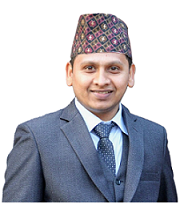| Database Management System (DBMS) (12 Hours) |
- Introduction to data, database, Database system, DBMS
- Field, Record, Objects, Primary Key, Alternate key, Candidate key
- Advantages of using DBMS
- DDL (Data Definition Language) and DML (Data Manipulation Language)
- Database Model: Network Model, Hierarchical Model, Relational database model
- Concept of Normalization: 1NF, 2NF, 3NF
- Centralized Vs. Distributed Database
- Database Security
|
Data Communication and Networking (15 Hours) |
- Basic elements of Communication System
- Concept of Communication System
- Block Diagram of communication System /Model
- Elements of Data Communication/Transmission
- Simplex, Half duplex and Full duplex communication mode
- Concept of LAN and WAN
- Transmission Medium: Guided and Unguided
- Transmission impairments terminology (Jitter, Singing, Echo, Crosstalk, Distortion, Noise, Bandwidth, Number of receivers)
- Basic concept of Networks Architecture: Client- Server and Peer-to-peer
- Some Basic Terms and Tool Used in Computer Network: IP Address, Sub Net Mask and Gateway, MAC address, Internet, Intranet, Extranet
- Network Tool: Packet tracer, Remote Login
- Network Connecting Devices: NIC, Modem, router, switch
- Network Topologies: Bus, Ring and star topology
- Basic Concept OSI Reference Model
- Internet Protocol Addressing
|
Web Technology II (12 Hours) |
- Introduction
- Server side and Client Side Scripting
- Introduction of internet technology
- Adding Java script to HTML page
- Java script fundamental
- Java Script Data types
- Variables and operators
- Functions and control structure if-else, if-else- if, switch-case, for, while, do while loop
- Object based programming with Java Script and Event handling
- Image, event and form objects
- Form validation, JQuery
- Server Side Scripting using PHP
- Introduction to PHP: Hardware and Software Requirements
- Object oriented programming with server side scripting
- Basic PHP syntax
- PHP data types
- Basic Programming in PHP
- Operators (Arithmetic, logical, comparison, operator precedence)
- Variables Manipulation
- Database Connectivity
- Connecting server side script to database
- Making SQL queries
- Fetching data sets getting data about data
- Creating SQL database with server side scripting
- Displaying queries in tables
|
Programming in C (12 Hours) |
- Review of C programming concept
- Functions
- Concept of library and user defined functions and advantages
- Function definition, prototype, call and return statements
- Accessing a Function by passing values
- Concept of storage: automatic and external
- Concept of Recursion: factorial and Fibonacci problems
- Structures and Unions
- Structure: Definition, Declaration, Initialization and Size of Structure.
- Accessing member of structure
- Array of structure
- Union: Definition, Declaration
- Difference between union and structure.
- Pointers
- Definition of Pointer
- Address (&) and indirection (*) operator
- Pointer Expression and Assignment
- Call by values and call by reference
- Working with Files
- Concept of Data File
- Sequential and Random File
- File manipulation function: putw, getw, putc, getc, fscanf, fprintf
- Opening, Reading, Writing and Appending data file
|
Object-Oriented Programming (OOP) (10 Hours) |
- Programming paradigms: procedural, structural and object oriented
- Features of OOP: Class, Object, Polymorphism and Inheritance
- Advantages of OOP
- Application of OOP
|
Software Process Model (10 Hours) |
- Software Project Concept
- Concept of software development process
- Concept SDLC life cycle
- System Analyst Vs Software Engineer
- Requirement Collection Methods
- Concept of system design
- Software and quality
- Software development model: waterfall, prototype, agile
|
Recent Trends in Technology (9 Hours) |
- Concept of Artificial Intelligence(AI)and Robotics
- Concept of Cloud Computing
- Concept of Big Data
- Concept of Virtual Reality
- Concept of e-com, e-medicine, e-gov.
- Concept of Mobile Computing
- Concept of Internet of things(IoT)
|

